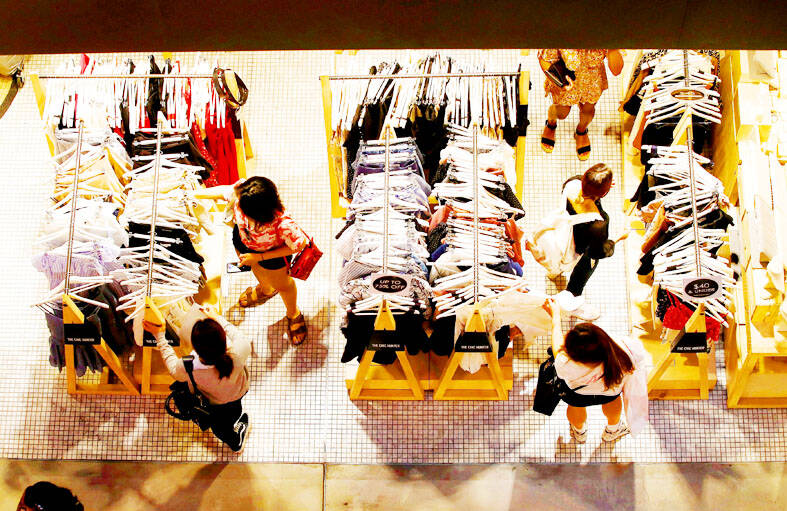Australia’s consumer confidence surged and business sentiment showed ongoing resilience after the Reserve Bank of Australia (RBA) left its key interest rate unchanged for the first time in its almost yearlong tightening cycle.
Consumer sentiment rose 9.4 percent this month to 85.8, a Westpac Banking Corp survey showed yesterday.
Still Westpac chief economist Bill Evans said he expects household spending this year to be lackluster with confidence remaining 10.4 percent below the level in April last year, the month before the RBA began raising rates.

Photo: Reuters
A separate National Australia Bank Ltd survey released an hour later yesterday showed that business conditions eased to 16 points last month, remaining well above long-run average.
Confidence advanced three points to minus-1.
“The survey suggests the economy is still holding up and indicates there has been some easing in inflation,” National Australia Bank chief economist Alan Oster said. “There is still a long way to go to bring inflation back down to the RBA’s target band and growth could be more volatile from there.”
RBA policymakers paused their tightening cycle last week as they attempt to engineer a soft landing in the economy while bringing down inflation.
The central bank has raised rates 3.5 percentage points since May last year to 3.6 percent and this month signaled the hurdle to further tightening is elevated.
The RBA’s inflation target is 2 to 3 percent and the most recent monthly reading came in at 6.8 percent.
RBA Governor Philip Lowe has said the board would closely monitor data on inflation, jobs, consumer spending and business surveys before making a decision on further increases.
“With underlying inflation still likely to be in the 6.5 to 7.0 percent range and the unemployment rate holding around fifty-year lows the case for extending the pause in May is likely to be challenged,” Evans said.
“The board’s decision will be to weigh the ‘here and now’ evidence against its two-year forecast,” he added.

BYPASSING CHINA TARIFFS: In the first five months of this year, Foxconn sent US$4.4bn of iPhones to the US from India, compared with US$3.7bn in the whole of last year Nearly all the iPhones exported by Foxconn Technology Group (富士康科技集團) from India went to the US between March and last month, customs data showed, far above last year’s average of 50 percent and a clear sign of Apple Inc’s efforts to bypass high US tariffs imposed on China. The numbers, being reported by Reuters for the first time, show that Apple has realigned its India exports to almost exclusively serve the US market, when previously the devices were more widely distributed to nations including the Netherlands and the Czech Republic. During March to last month, Foxconn, known as Hon Hai Precision Industry

Taiwan Semiconductor Manufacturing Co (TSMC, 台積電) and the University of Tokyo (UTokyo) yesterday announced the launch of the TSMC-UTokyo Lab to promote advanced semiconductor research, education and talent development. The lab is TSMC’s first laboratory collaboration with a university outside Taiwan, the company said in a statement. The lab would leverage “the extensive knowledge, experience, and creativity” of both institutions, the company said. It is located in the Asano Section of UTokyo’s Hongo, Tokyo, campus and would be managed by UTokyo faculty, guided by directors from UTokyo and TSMC, the company said. TSMC began working with UTokyo in 2019, resulting in 21 research projects,

Taiwan’s property market is entering a freeze, with mortgage activity across the nation’s six largest cities plummeting in the first quarter, H&B Realty Co (住商不動產) said yesterday, citing mounting pressure on housing demand amid tighter lending rules and regulatory curbs. Mortgage applications in Taipei, New Taipei City, Taoyuan, Taichung, Tainan and Kaohsiung totaled 28,078 from January to March, a sharp 36.3 percent decline from 44,082 in the same period last year, the nation’s largest real-estate brokerage by franchise said, citing data from the Joint Credit Information Center (JCIC, 聯徵中心). “The simultaneous decline across all six cities reflects just how drastically the market

Ashton Hall’s morning routine involves dunking his head in iced Saratoga Spring Water. For the company that sells the bottled water — Hall’s brand of choice for drinking, brushing his teeth and submerging himself — that is fantastic news. “We’re so thankful to this incredible fitness influencer called Ashton Hall,” Saratoga owner Primo Brands Corp’s CEO Robbert Rietbroek said on an earnings call after Hall’s morning routine video went viral. “He really helped put our brand on the map.” Primo Brands, which was not affiliated with Hall when he made his video, is among the increasing number of companies benefiting from influencer